|
|
Current Issue
Just Like Old Times
Taiwan's Kevin Cheng topped the strongest field ever to win the controversy-free (well, almost) U.S. Open 9-Ball Championships.
By Mike Panozzo
Outside of perhaps the Mosconi Cup, the 2015 U.S. Open 9-Ball Championships was the most anticipated tournament of the year in the United States, and it was so for several reasons.
For starters, the October event at the Norfolk Sheraton Waterside hotel in downtown Norfolk, Va., marked the 40th anniversary of room owner/promoter Barry Behrman's annual tournament. It is possibly the longest-running major pool tournament in the world. It is certainly the marquee pool event in the U.S., and has been since the early '80s. Even given Behrman's spotty prize money history over the past decade, the U.S. Open has soldiered on and remains a coveted title for all players...
which segues to the second reason the 2015 tournament was met with such positive anticipation: Pat Fleming. After several attempts by players groups to monitor the U.S. Open prize fund, Behrman, understanding the need to regain the players' trust, leaned on his longtime friend, Fleming. The former player and Accu-Stats Video Productions founder agreed to facilitate the entry fee process and collect all of the sponsor-added monies into a bank account, which he alone controlled...
which, not surprisingly, lead to a full 128-player field weeks in advance of the tournament. In addition, with both American and European players still jockeying for Mosconi Cup points and with the World Pool-Billiard Association awarding world ranking points for participants, the 40th U.S. Open drew the strongest international field in its history. In fact, with 26 of the top 32 players in the WPA world rankings sprinkled throughout the stacked field, the U.S. Open was arguably shoulder-to-shoulder with the WPA World 9-Ball Championship as the most competitive tournament of 2015.
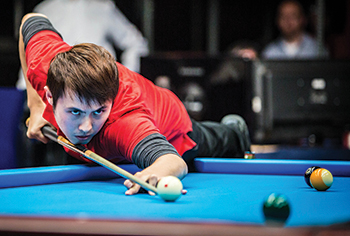
After winning his first major title in China, Cheng zeroed in on the U.S. Open crown. Photo by Dandy Sese
All that anticipation was rewarded when, for one week in October, the pool gods smiled down on Behrman and his U.S. Open, and the tournament looked like its old self again, only better.
And after 27-year-old Taiwanese ace Yu-Hsuan "Kevin" Cheng safely deposited the case 9-ball in his 13-7 title-match win over England's Karl Boyes, Behrman smiled and gushed, "I can hold my head up high. It's been a while since I've been able to do that."
Indeed, the past decade has seen annual prize money shortages, delayed payments and a litany of excuses and apologies. But with the respected and trustworthy Fleming holding the purse strings this year, players were able to compete without fear of getting paid in IOUs. The results were evident.
Despite the relatively hefty $1,000 buy-in, the world's top players descended on Norfolk en masse. An astonishing 31 countries were represented in the field, including 10 players from China and Taiwan, countries that have dominated the international pool scene in the past three years. In fact, champion Cheng was quick to point out that he is no better than sixth in the Taiwanese player hierarchy, a contingent that includes 2015 double world champion Pin-Yi Ko. "Every Taiwan player here is ranked higher than me," Cheng said.
Still, the U.S. Open wouldn't be the U.S. Open with at least a modicum of controversy, and the 2015 tournament got that out of the way before the first ball was even struck. A beef between Behrman and tournament director Jay Helfert resulted in Helfert resigning (or being fired, depending on who you talked to) shortly after the player draw. A discrepancy in player lists left former champion Allen Hopkins off the board. (Behrman invited all former champions to play without having to post an entry.) Since the draw was already completed, Helfert refused to add Hopkins to the tournament. Behrman posted a note offering to compensate any player who would give his spot in the event to Hopkins. A player (who was scheduled to play Warren Kiamco of the Philippines in the opening round) stepped forward and Behrman posted Hopkins name on the tournament board.
"You simply don't change the board once the draw is completed," said Helfert later. "That's a cardinal rule in directing a tournament. Barry disregarded my ruling, so I couldn't, in good conscience, continue to be the tournament director."
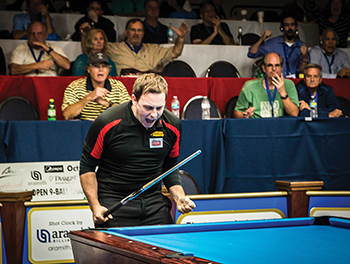
Boyes reached the title match with a remarkable comeback in the semis.Photo by Dandy Sese
Longtime tournament director Scott Smith assumed Helftert's duties for the remainder of the event. (Kiamco beat Hopkins, 11-6, in the first round. Hopkins was eliminated by Stevie Moore in his next match, 11-9.) First-round drama gave way to first-round thrills when the field's only woman player, Karen Corr, ran over the highly touted Ko, 11-4. Despite a less-than-imposing break, Corr displayed the run-out skills and precision safety play that made her a dominant player on the women's pro tour for a decade during the pasting. The normally reticent Corr even supplied a moment of levity when she prematurely celebrated after winning her ninth game, thinking the match was a race to nine. Laughing at her own mistake, Corr nonetheless returned her focus to the match and captured the next two games to put make her win official.
Corr proved her win was no fluke by pounding James Blackburn in the second round, 11-1, and had a chance to knock off favored Jayson Shaw in the third round before scratching in the case game of an 11-10 heartbreaker. (Corr was later eliminated by Filipino Francisco Felicilda, 11-5, to finish tied for 33rd.)
As has been the case in recent years, the field was bolstered by European and American players vying for spots in the Mosconi Cup. Automatic spots were attainable for three players on each team based on points earned in a predetermined list of events published early in the year by event promoters Matchroom Sport. The U.S. Open was that final ranking event for both squads, which added yet another layer of tension to the already pressure-packed tournament. Two of the three automatic bids were secured for each squad, with Shane Van Boening and Mike Dechaine locked into Team USA and Holland's Niels Feijen and Austria's Albin Ouschan assured of spots on Team Europe. More than 30 European players cued up for the Open, joining nearly 60 players from the U.S. And while many had little or no chance of securing a spot on Team USA or Team Europe, European players like Ralf Souquet, Nick van den Berg, Daryl Peach, Karl Boyes, Mika Immonen, Thorsten Hohmann and Americans Skyler Woodward, Corey Deuel, Justin Bergman, Rodney Morris, Scott Frost, Oscar Dominguez and Johnny Archer all entertained hopes of either landing the final guaranteed spot on their team, or playing well enough to draw consideration for one of the two "captain's pick" spots available on each squad.
But while the early rounds featured numerous tantalizing matchups of champion-caliber players, and the "Mosconi Watch" was in earnest, all eyes were understandably on Van Boening. Coming into the 2015 Open, America's No. 1 was not only riding the wave of three consecutive U.S. Open championships, but he was on a 26-match winning streak in U.S. Open play. (Van Boening's last loss in the U.S. Open was in 2011, when he was relegated to 17th place.) After running his winning streak to 28 matches with opening wins over Shaun Wilkie (11-6) and Roberto Gomez (11-9), Van Boening was sent to the loser's bracket by Bergman, whose 11-7 win certainly boded well for his Cup chances.
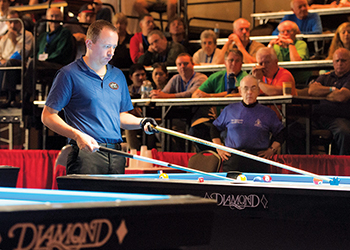
Van Boening's admission ended his bid for four straight titles.Photo by Jon Loder
Given the depth of the U.S. Open field, the loser's bracket was a dangerous place to make a living, and it quickly led to Van Boening's demise. After ousting Feijen, 11-4, Van Boening found himself in a tight tussle with Deuel. Trailing, 10-9, but at the table with a chance to clear the table and get the break shot in the deciding game, Van Boening positioned the bridge on the table for a shot he couldn't reach. As he was getting over the shot, he felt the shaft of the bridge touch the 9 ball. Deuel didn't react. Neither did referee Karl Kantrowitz. Van Boening paused for a second, then went over to tell Kantrowitz that the bridge had touched the 9. Since the rules stipulated fouls on all balls, Kantrowitz told Van Boening that the bump constituted a foul, Deuel received cue ball in hand and the match ended shortly thereafter.
"I knew nobody saw it," said Van Boening, matter-of-factly. "But it's just not a good thing to lie about it. We're professionals. It may have put me out of the tournament, but maybe it happened for a reason. I know I'll never make that mistake again."
With Van Boening out, the attention turned to the winner's bracket, where the international nature of the field was becoming apparent. The final 16 on the winner's side featured just three American players - Dechaine, Bergman and Morris. Seven Europeans reached the fourth round, joined by six Asian players. The unbeatens, however, were not all the usual suspects. Joining Pin-Yi Ko in the loser's bracket early were two-time U.S. Open champ Darren Appleton, who dropped his third-round match to surging young Russian Ruslan Chinakov, 11-8, and 2012 World 8-Ball Champion Jung-Lin Chang of Taiwan. Chang was beaten by Germany's 48-year-old Oliver Ortmann, whose spirited run to a ninth-place finish in Norfolk coincided with his induction into the Billiard Congress of America Hall of Fame. Ko's younger brother, Ping-Chung, winner of the 2014 CSI 8-Ball Invitational, was also an early casualty, losing to Deuel, 11-7, and Ivan Putnik, 11-8.
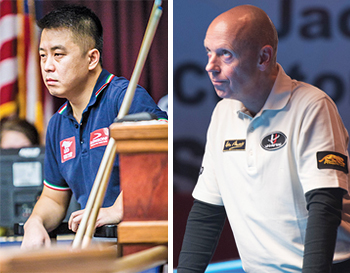
Liu (left) failed to close against Boyes, while Souquet (right) fell short in his bid for a second U.S. Open title.Photo by Dandy Sese
Still, the winner's bracket was stacked with talent, including former winners Morris, Souquet and Immonen. The bracket, however, would lean in the favor of the United Kingdom and Taiwan. Shaw, the mercurial transplanted Scot who has been a force in and around his adopted New York home, appears to be on the precipice of greatness. With two Turning Stone Classic titles and the always-tough Ginky Memorial crown already on his 2015 resume (along with a second at the Players Championship), the 27-year-old lefthander was a popular pick amongst U.S. Open prognosticators. And his solid play in Norfolk gave the punters reason to be optimistic. After holding off Corr, Shaw looked unbeatable in wins over Filipino Carlo Biado (11-7) and Ortmann (11-8).
Matching Shaw was Boyes, who entered the U.S. Open well off form and needing a deep run in the tournament to secure a spot on Team Europe for the Mosconi Cup. Boyes had already rolled over American Woodward, 11-6, and posted solid wins over a pair of Chinese hopefuls, Jinhu Dang (11-5) and the dangerous Haito Liu (11-8).
Meanwhile, Cheng and Kai-Lu Hsu, the 2011 China Open champion, rode a collision course that saw Cheng follow up his win over Deuel, 11-6, with a squeaker over Bergman, 11-10, and an 11-6 win over Chinakov. Hsu moved on to the winner's semifinals by topping Dechaine, 11-7, and Souquet, 11-8.
Boyes continued his strong play, winning the final two game for a tough 11-9 decision over Shaw, while Cheng earned his spot in the winner's final with an 11-8 win over countryman Hsu.
The punishing loser's bracket featured one heavyweight bout after the next. Americans Deuel and Bergman were eliminated in the loser's quarterfinals, finishing tied for ninth, but Deuel's four-match loser's bracket streak earned him enough points to secure one of the three guaranteed spots on Team USA. Dechaine was ousted a round earlier, also earning sufficient points to grab the third spot. Still, Bergman's strong showing was enough to convince Team USA captain Mark Wilson to include the 28-year-old on the final roster. (See Mosconi Cup story, pg. 34)
Souquet, the Billiard Congress of America Hall of Famer and a key player on numerous Mosconi Cup squads, made his own strong push. After ousting Deuel, 11-9, the steady German scored consecutive 11-10 nail-biting wins over Chinakov and Shaw to reach the loser's bracket semifinal. But his bid for a second U.S. Open title, and likely his bid for the Mosconi Cup, got derailed by Liu, 11-6.
The winner's bracket finale featured the 32-year-old Boyes, the 2010 World 8-Ball Champion and 2013 Derby City Big Foot 10-Ball champ against young Cheng in a match that could be labeled, "Cut and Dry." While Boyes failed to pocket a single ball on his four break attempts, Cheng put on a clinic with a cut break that resulted in six run-outs, four of which came in a mid-match spurt that propelled the young Taipei star from a 6-3 lead to a 10-3 stranglehold. After surrendering one more game to Boyes, Cheng completed his 11-4 win to earn a spot in the title match.
"I'm breaking the balls well and playing with confidence," said Cheng, who just weeks before the U.S. Open won his biggest title to date, the Miyun 9-Ball Championship in Beijing. "Winning the [Miyun] tournament was very important for me." Having clinched one of the coveted Mosconi Cup slots for Team Europe by reaching the winner's bracket final, Boyes could have been excused if he suffered a letdown against Liu in the loser's bracket final - especially after seeing the Taiwanese star run rack after rack to turn a 4-4 tie into a 9-4 advantage. But Boyes was far from finished. After Liu relinquished the table, Boyes used a series of break-and-runs and Liu fouls to rattle off six wins of his own to reach the hill at 10-9. And when he rifled in one nervy shot after another in a trick final rack, Boyes' comeback was complete.
"Karl played the match of his life from 9-4 down," commented Boyes' Brit running mate, Appleton.
Unfortunately for Boyes, his rematch against Cheng in the championship looked a lot like the winner's bracket final. Cheng used a pair of break-and-runs to get the early lead in the extended race-to-13 match, 3-1, then capitalized on two Boyes errors to gain a 5-1 advantage. Another break and run increased the lead to 6-1, before Boyes came out on top of several safety battles to close to within two games at 6-4.
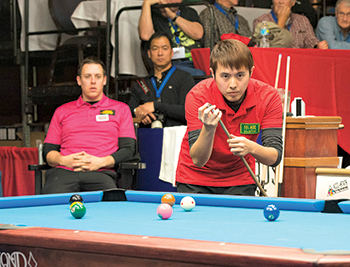
Cheng topped Boyes twice to secure the 40th U.S. Open trophy.Photo by Dandy Sese
Boyes' best chance to make it a match came in the next rack, when Cheng missed a long shot on the 1 ball. Boyes pocketed a table-length bank on the 4 and looked to be in control when he inexplicably jarred the 8 ball in a corner pocket. Instead of trailing by just a game and having the next break, Boyes found himself down three, 7-4. The pair traded games to 9-6, after which Cheng all but sealed the deal with three consecutive break-and-runs for a commanding 12-6 lead. The final game saw both players struggle with position play and safeties, before a kick attempt by Boyes left the remaining three balls in the clear. Cheng safely deposited all three for the 13-6 win.
"The final wasn't perfect," admitted Cheng, in more-than-passable English. "But I'm so happy with the result that I have no idea in my head!" Cheng, who was given his "American nickname," Kevin, by an English teacher at the university he attended in Taipei (where he studied economics), has played in the U.S. before. Staying with friends in Houston for several months at a time ("to learn better English"), Cheng has played in a number of Texas tour events, participated in the 2013 U.S. Open 8-Ball and U.S. Open 10-Ball tournaments, and won the White Diamond bar table title in Louisiana in 2014.
"Here, I studied the way the top players were breaking," said Cheng, $40,000 richer for his effort. "I watched Shane Van Boening, Mike Dechaine and Corey Deuel when they played. In the final, the break wasn't as strong. I think I was a little nervous, plus the rack just wasn't as tight."
For Boyes, the match ended in disappointment, but the tournament was a huge success.
"I came here not in good form and not in the Mosconi Cup," he said. "If you'd have told me two weeks ago that I'd come here, finish second at the U.S. Open and make the Mosconi Cup, I'd have snapped that up!"
Ortmann, Ursitti Honored
"I remembered the times when I was a teenager in Germany, full of ambition and enthusiasm," was Oliver Ortmann's recollection of hearing the news that he had been elected into the Billiard Congress of America Hall of Fame during his acceptance speech on Oct. 29, at the Sheraton Norfolk Waterside in Norfolk, Va. "I had read about the American heroes, and heard about the Hall of Fame, where only the best players in the world get in. I thought, 'Wow, to be part of that one day!' To me, it was just a dream."
Ortmann was inducted into the Greatest Players category in Norfolk, with promoter and historian Charlie Ursitti earning a spot in the Hall's Meritorious Service wing. The annual induction banquet, held during the U.S. Open 9-Ball Championships, drew fans, players and living Hall of Famers, including Johnny Archer, Loree Jon Jones, Karen Corr, Mika Immonen, Ralf Souquet, Pat Fleming and Danny DiLiberto. Ortmann and Ursitti became the 65th and 66th inductees into the billiard hall.
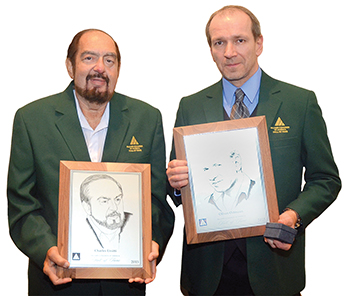
Ursitti (left) and Ortmann (right) were humbled by their inclusion in the Hall of Fame. Photo by Tony Fox
Ortmann, 48, was introduced by legendary instructor Jerry Briesath, who credited the German star with launching the "European Invasion." It was Ortmann, noted Briesath, who became the first European player to win a major title in the United States when he defeated Steve Mizerak in the final to win the 1989 BCA U.S. Open Straight Pool Championship in Chicago. Ortmann was 22 years old at the time. Ortmann went on to win the World 9-Ball Championship in 1995. He also won 13 Euro Tour titles and a pair of International Challenge of Champion crowns during his storied career. Jones introduced Ursitti, who is credited with promoting numerous televised pool events during the '70s and '80s, including the legendary Willie Mosconi vs. Minnesota Fats "Great Pool Shootout" on ABC Wide World of Sports. The first Mosconi vs. Fats tilt remains the highest rated pool match ever, drawing more than 10 million viewers. Ursitti was also a huge supporter of Jones.
"Aside from my dad," Jones said, "no one had a bigger impact on my pool career than Charlie." "I'm proud, not only of the 'Great Pool Shootout,' which was something great," said Ursitti, "but proud of what I did for the industry with all of the events we produced."
The Hall of Fame Banquet also afforded the opportunity for the first Tony Robles Sportsmanship Award to be presented. Longtime player/promoter/tournament director Jay Helfert created the award, naming it after Robles, one of the game's most respected and loved players. Robles was on hand to present the award to Oscar Dominguez, a top American player and founder of the Mezz West Tour.
The World Pool-Billiard Association also presented a plaque to room owner and promoter Barry Behrman, in recognition of his 40th consecutive year of running the U.S. Open 9-Ball Championships.
Whither the U.S. Open?
Quit while you're ahead. Isn't that how the saying goes?
For the first time in nearly a decade, promoter Barry Behrman's U.S. Open 9-Ball Championship started virtually worry-free and finished without a single post-dated check.
"I can hold my head high," Behrman said.
Of course, Behrman had help, and plenty of it. After numerous prize fund fiascos in the past 10 years, Behrman enlisted the help of longtime friend and live-streaming coverage partner Pat Fleming of Accu-Stats Video Productions. Fleming collected, held and dispersed the entire prize fund in 2015, and every player left the Norfolk (Va.) Sheraton Waterside hotel in a good mood. The sense of satisfaction and accomplishment was not lost on Behrman, who almost immediately announced plans to step away from his role as chief negotiator, sponsorship salesman and primary operations man for the 40-year-old tournament. In an interview posted on the website, AZBilliards.com, Behrman said: "I always wanted to go out on a high note, and the 40th U.S. Open certainly gives me the opportunity to do just that. It was the best Open Championship ever, and now I can look back at the event and know I left it in good shape, primed for the next generation of management."
Sighting his age (70) and health considerations, Behrman said that he wished to focus his efforts on his 72-table Virginia Beach poolroom, Q-Master Billiards. He added that his preference is to have Fleming assume complete control over the running of the tournament. Behrman would still own the name and rights to the event.
"[Pat] has done a great job to grow Accu-Stats into the international presence that it is today," Behrman said. "He has earned the trust of players and fans, and he did a great job this year with the money." When contacted about Behrman's announcement, Fleming insisted the two have had only "preliminary" discussions about taking over the U.S. Open.
"I expect to have discussions with him soon," Fleming said. "But we haven't even started to discuss details. We would need to define Accu-Stats' role. And if Accu-Stats takes on this responsibility in the future, we would want complete control over every aspect of the event."
While Accu-Stats role in 2015 was relegated to prize fund collection and distribution, control over the U.S. Open would likely include sponsorship, ticket sales, staffing, arena build-out and more. And with added responsibility comes added liability, concerns not lost on Fleming.
"There are a lot of other expenses involved, and that's a concern, of course," Fleming said. And if Accu-Stats could not come to an agreement with Behrman? "It would be impossible to move forward." Behrman said. "That simple." |
|





